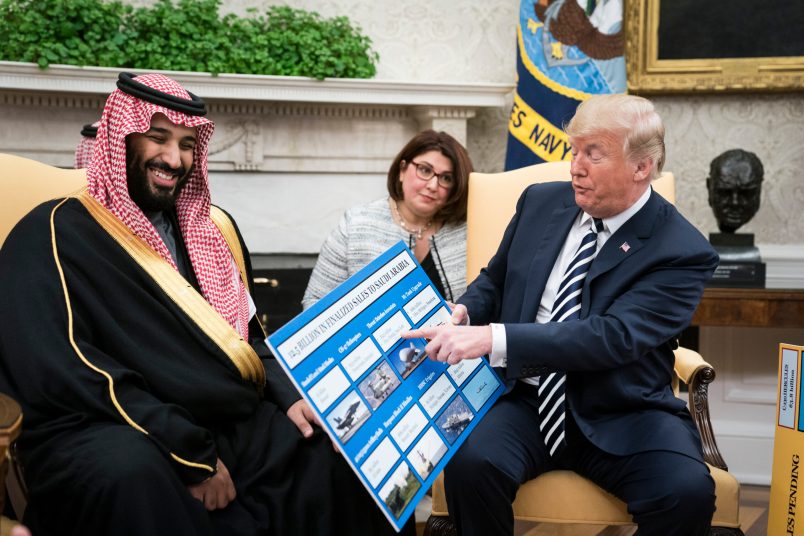At the frontier of political and economics journalism there’s a long running dialogue looking for that key development that will finally tip the post-COVID U.S. economy into recession. Think of it as a part of “soft landing” discourse, now mixing together analyses of inflation, Fed rate hike policy, the end of loan forbearance and post-COVID savings running dry. In recent weeks it’s focused on the price of oil and thus gas creeping back up towards $100 a barrel. Yesterday saw the biggest one day rise since the Spring.
The drivers of oil prices are complex. Part of the rise is fueled by the very strength of the U.S. and global economy, which is driving up demand. But the big driver is supply and particularly the policy to restrict supply and drive up prices, a policy headquartered in Saudi Arabia. Rising oil prices help keep inflation high. They also increase pressure on the Fed to maintain or increase interest rates. Both have bad effects on the U.S. (and global) economy, as well as knock-on political impacts on Joe Biden’s reelection effort.
The current supply restrictions grow from an ongoing Saudi-Russia agreement to restrict supply to drive up prices under the OPEC+ umbrella. The most recent agreement on cuts dates from the beginning of the summer. Since then the Saudis have announced their own unilateral cuts and then extended them. Indeed, the Saudis have taken multiple steps to prop up the Russian economy since the beginning of the Ukraine war, picking up the slack created on various fronts by the imposition of Western sanctions.
There was talk early this summer that the Saudi-Russia oil pact — what Bloomberg aptly called their “crude, inflationary alliance” — might be under strain in the face of Russia’s apparent cheating on the agreed upon production limits. Russian cheating is not a surprise. To fund its war effort Russia needs the price of oil to be high and it needs to sell a lot of it — two goals which can be hard to pull off together. But the Saudis seem to have generally looked the other way. Indeed, they’ve increased their own cuts beyond the deal with Russia. Thus, intentionally or not, the Saudis find themselves subsidizing the Russian war effort by keeping supply off the market while Russia gets much of the immediate benefit.
For weeks the energy and economics press have been filled with questions about just how high the Saudis want oil prices to go and just how long they’ll be throttling supply. So why is this happening?
As noted above, Russia’s goals are clear and understandable. They need to profit as much as possible from the sale of oil to sustain their war effort. Any secondary benefit in damaging Western economies or damaging Joe Biden’s political prospects just sweetens the deal. We’d do the same in their place: the U.S. and the Biden administration are funding a war effort that is pulverizing the Russian land army.
But what about the Saudis?
One obvious answer that plays a surprisingly small role in U.S. press coverage: the Saudi Kingdom’s growing hostility to the U.S. and, specifically, the U.S. under a Democratic administration. The Kingdom’s closeness to the Trump family is notorious. They cut Jared Kushner a $2 billion check to manage right after Joe Biden took office. They’ve directed a huge amount of the Kingdom’s massive investment in U.S. golf and subsequent takeover of the PGA into Donald Trump’s coffers. It must be a godsend for Trump, as bad publicity combined with interlinked legal and banking woes have impacted his pre-presidential businesses.
There are of course other potential answers. Indeed, there are additional potential answers which are not exclusive of their geopolitical aims or desire to meddle in U.S. politics. The Saudis have an obvious interest in preventing oil prices from going too low. Perhaps the Saudis are stepping in with further supply cuts not in spite of Russian cheating but because of it — because they know the exigencies of the Ukraine war give Russia little choice but to break its agreed upon caps.
I lack the expertise to litigate just what the mix or weight of Saudi Arabia’s different motives are here. What I do know is that the Saudis have cultivated strong personal and financial ties with the Trump family. They display a barely veiled hostility toward the Biden administration. They’d like the former guy back in power. And for whatever reason — who can guess? — they again and again find themselves taking steps that are at best unhelpful to the U.S., and the Biden administration specifically. Perhaps Joe Biden is just super unlucky. But it’s more likely that Mohammad bin Salman is at the very least putting his thumb on the scales against Biden’s reelection efforts when and where he can.
So let’s ask ourselves again. Why on earth are we considering giving these malign actors a Korea-style security guarantee? Every great power does business with unsavory regimes when it is in their hard geopolitical interests to do so. It’s harder to explain doing business and favors for such an unsavory regime when it appears to be actively working against American geopolitical interests and actively trying to return its favored U.S. presidential candidate to power.


